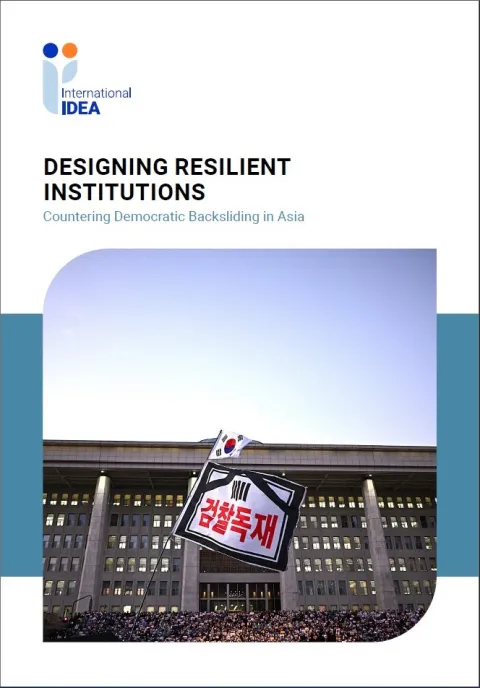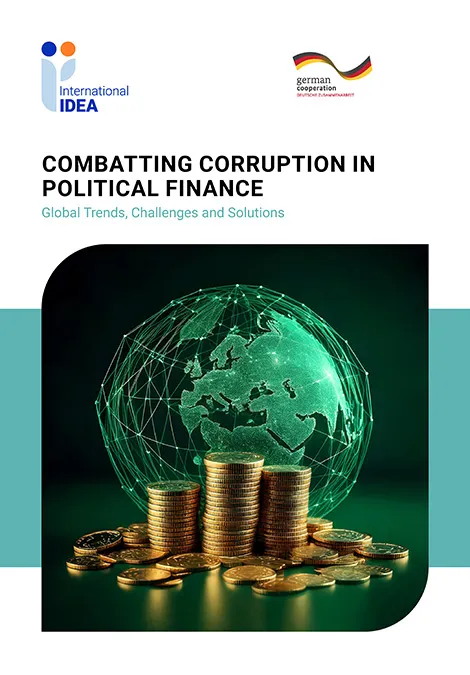El jueves 22 y viernes 23 de septiembre, expertos se reunirán en Nueva York para analizar la realidad de la región, en el contexto global. El encuentro se organiza junto a IDEA Internacional, con el apoyo de la Universidad de Fordham
Search
Region
Country
Type
The participants of the third annual Women Constitution-Makers’ Dialogue explored comparative constitutional design approaches to legal pluralism and reconciling tensions between customary/religious systems and guarantees of gender equality and non-discrimination.
En el marco del día internacional de la democracia, podemos establecer un balance de los avances y desafíos del Paraguay tras más de tres décadas de régimen democrático.
Emerging from the most chronic impacts of the Covid-19 pandemic, countries in Asia and the Pacific region are facing challenges as governing systems in the region grapple with the stressors associated with the pandemic.
On 18 June 2021, the UN General Assembly adopted a Resolution which calls upon the Myanmar armed forces “to respect the will of the people as freely expressed by the results of the general election of 8 November 2020, to end the state of emergency, to respect all human rights of all the people of Myanmar and to allow the sustained democratic transition of Myanmar, including the opening of the democratically elected pa
International IDEA hosted a panel discussion on the state of Sweden’s democracy on 7 September 2022, ahead of the International Day of Democracy and Sweden’s general elections on 11 September 2022. The panellists were Anders L.
Paraguay has been making continuous efforts to consolidate its democratic institutions since the instauration of the regime in 1989. An ample political consensus allowed for the drafting and adoption of a democratic Constitution in 1992, which ushered in a period of legal reforms to complete the Republic’s new regulatory framework. One such key element is the Electoral Code of 1996.
The women’s training programme, led by the national electoral management body in cooperation with International IDEA, earned an Honorable Mention in the Gender Equality category in the first edition of the Global Network on Electoral Justice Awards for meeting the main criterion of contributing to a concrete and measurable increase in gender parity in public life.
The European Union and its Member States are the biggest providers of democracy support worldwide. Advancing democracy, the rule of law, human rights and fundamental freedoms is one of the objectives of the EU´s external action, as set out in Article 21 of the Treaty on the European Union.
Los resultados son claros. La opción rechazo triunfó con casi el 62% de los votos válidamente emitidos. Esto, además, con una participación electoral histórica en las últimas décadas, que ahora con voto obligatorio, llegó casi al 86%. Por supuesto, los datos aún son iniciales, pero ya nos entregan ciertas luces.
The theme for the 2021 Edinburgh Dialogue was ‘The Changing International Order and Its Impact on Constitution Building Support’. This Dialogue sought to contribute new thinking on the constitutional implications likely to be triggered by changes to both the international order and the nature of conflict in the past decade, in particular given their impact on the peacebuilding field, which attempts to revise the underlying political settlement.
Most of us are familiar with the concept of insuring our valuable assets, be it our house, car, or health. Professionals and businesses can also buy insurance to protect themselves against liability or loss. However, despite being a critical asset of democracies, a comprehensive insurance policy for protecting the integrity of elections does not exist.
The recent revelations that some political parties in Sweden have tried to circumvent donation rule
En este artículo se propone realizar un análisis longitudinal de los resultados de elecciones presidenciales peruanas desde 2001, con el propósito de verificar la existencia de patrones supuestamente anómalos que, desde diversos sectores, se utilizaron como evidencia para señalar una manipulación sistemática de votos (fraude) durante las elecciones generales del 2021.
The recent postponement of the local polls in Karachi, Pakistan due to the extreme weather (Khan 2022) is an example of how natural hazards can affect an electoral process. To date, the floods have submerged a third of the country, destroying critical infrastructure and killed more than 1,000 people.
Like other natural disasters, wildfires can have sudden calamitous impacts on communities, destroying buildings, damaging infrastructure and displacing populations. In this chapter we examine the Californian wildfires occurring from September 2015 to November 2018 to assess their effect on two electoral cycles in the state (2016 and 2018), and to study how electoral practitioners cope with these challenges in a developed democratic setting.
“Authoritarianism is on the rise, but resilience and democratic pushbacks are alive as well”. This headline properly captures the democratic trends in the Asia and Pacific region, characterised by extraordinary diversity in terms of country size, traditions, development but also of regime types and performances. These range from some of the most enduring autocratic regimes to some of the best performing democracies in the world.
The challenges faced by electoral administrators in holding Haiti’s 2010 elections were extreme. Even before the country was confronted with the effects of the compound disasters addressed in this case study, it was dealing
with long-term societal and institutional problems that severely impeded electoral administration.
Two years out from the next Indonesian election, preparations are well underway for political parties in one of the world’s most populous democracies. As a presidential representative democracy for more than 20 years, the country has upwards of 80 political parties. Despite this vibrant political environment, Indonesia’s democracy has shown signs of democratic backslides, notably in the areas of corruption and parliamentary effectiveness.
The 2019 elections in Mozambique were preceded by two cyclones that directly and significantly affected the electoral process in the central and northern regions. In addition to the cyclones, terrorist attacks which began in 2017 had a negative impact on voter registration and voting processes.
This case study provides several findings and lessons learned.


